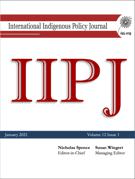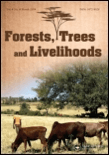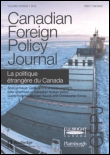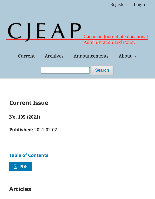
International Indigenous Policy Journal
Scope & Guideline
Advancing Indigenous Voices in Global Policy
Introduction
Aims and Scopes
- Indigenous Rights and Governance:
Research addressing the frameworks, policies, and practices that affect Indigenous rights, governance structures, and self-determination, often incorporating Indigenous perspectives and methodologies. - Culturally Relevant Health and Well-being:
Studies focusing on health outcomes, healthcare policies, and interventions that are culturally appropriate for Indigenous populations, emphasizing holistic approaches that integrate traditional knowledge. - Community-Based Research and Protocols:
Promoting research methodologies that prioritize Indigenous community involvement and leadership, ensuring that research processes respect cultural protocols and local knowledge. - Social Justice and Economic Equity:
Investigations into policies and practices that aim to rectify historical injustices faced by Indigenous peoples, including economic development, social welfare, and educational equity. - Environmental Stewardship and Rights:
Exploration of Indigenous perspectives on environmental governance, land rights, and sustainability practices, highlighting the connection between Indigenous identity and ecological stewardship.
Trending and Emerging
- Indigenous Health Innovations:
There is a growing emphasis on health innovations tailored to Indigenous communities, including culturally relevant healthcare models and community-led health initiatives, reflecting a recognition of the unique health challenges faced by these populations. - Policy Analysis and Critique:
A notable trend towards critically analyzing existing policies affecting Indigenous peoples, with an emphasis on how these policies interact with Indigenous rights and well-being, indicating a proactive approach to advocacy and reform. - Youth Engagement and Empowerment:
Emerging themes around Indigenous youth, including their roles in cultural continuity and health, highlight the importance of engaging younger generations in policy discussions and community leadership, recognizing their potential as catalysts for change. - Data Governance and Ethical Research Practices:
Increasing focus on Indigenous data sovereignty and ethical research practices indicates a shift towards prioritizing Indigenous control over data and research processes, ensuring that Indigenous communities benefit directly from research outcomes. - Crisis Response and Resilience:
Research addressing community responses to crises, such as the COVID-19 pandemic and the opioid crisis, showcases Indigenous resilience and adaptation strategies, emphasizing the need for policies that support community-led recovery efforts.
Declining or Waning
- Traditional Ecological Knowledge (TEK):
Although still relevant, the frequency of papers specifically dedicated to traditional ecological knowledge has diminished, indicating that the focus may be shifting towards integrating TEK within broader environmental governance discussions rather than treating it as a standalone subject. - Historical Analysis of Indigenous Policies:
Research centered on the historical analysis of Indigenous policies, while still important, has seen a reduction in the number of papers published, suggesting a potential shift towards more forward-looking discussions rather than retrospective assessments. - Colonial Impact Studies:
Studies specifically analyzing the impacts of colonialism on Indigenous communities have become less prevalent, as the journal may be moving towards solutions-oriented research rather than predominantly focusing on past grievances.
Similar Journals

Amazonia Investiga
Unveiling the Secrets of the Amazon RegionAmazonia Investiga is an innovative scholarly journal dedicated to the multidisciplinary study of the Amazon region, offering a platform for research that spans ecology, anthropology, social sciences, and environmental studies. Published by Editorial Primmate, the journal emphasizes open access, ensuring that findings and insights contribute to global knowledge without barriers. With its E-ISSN 2322-6307, Amazonia Investiga is committed to promoting interdisciplinary collaboration and understanding of the Amazon's critical issues, including biodiversity, sustainable development, and indigenous rights. Although specific metrics such as H-Index or Scopus rankings are not yet established, the journal aims to elevate its status as a key resource for researchers and practitioners engaged in the vital conversations surrounding the future of the Amazon. The editorial team welcomes original research articles, reviews, and case studies that shed light on the intricate relationships within this unique ecosystem, furthering the impact of local and international scholarly contributions.

Forests Trees and Livelihoods
Fostering Knowledge for a Greener FutureForests, Trees and Livelihoods is a distinguished journal published by Taylor & Francis Ltd, focusing on the intricate relationships between forestry, environmental sustainability, and rural livelihoods. With an ISSN of 1472-8028 and an E-ISSN of 2164-3075, this journal has been a pivotal platform since its inception in 1999, converging on contemporary issues through 2024. Ranked in the Q2 quartile of the forestry category, it stands at rank #77 out of 174 in Scopus, evidencing its significance in agricultural and biological sciences. The journal aims to disseminate novel research findings, policy analyses, and case studies that inform sustainable forestry practices and contribute to improving the livelihoods of communities reliant on forest resources. Through its commitment to quality and accessibility, Forests, Trees and Livelihoods is an essential resource for researchers, professionals, and students striving to enhance understanding and practices in the field of forestry.

Canadian Foreign Policy
Exploring Canada's Role in a Complex WorldCanadian Foreign Policy is a premier academic journal dedicated to the analysis and exploration of foreign policy issues related to Canada within the broader context of international relations. Published by Routledge Journals, a leading name in scholarly publishing, this journal offers a platform for original research and critical discourse, reflecting the increasing complexity of global dynamics affecting Canadian diplomacy. With an impact factor placing it in the Q2 quartile of the Political Science and International Relations categories, and ranked #411 out of 706 in its field according to Scopus, the journal serves as a vital resource for researchers, practitioners, and students alike. Its open access availability enhances its reach, promoting an inclusive academic dialogue. Canadian Foreign Policy aims to foster a deeper understanding of Canada's role in the world and the implications of its policies, making it essential reading for anyone interested in contemporary global affairs.

Canadian Journal of Educational Administration and Policy
Fostering Dialogue on Canadian Educational PracticesThe Canadian Journal of Educational Administration and Policy, published by the University of Manitoba's Department of Educational Administration, Foundations, and Psychology, serves as a vital platform for scholars and practitioners committed to the enhancement of educational leadership and policy across Canada. With an ISSN of 1207-7798 and an E-ISSN of 1207-7798, this journal actively contributes to the discourse surrounding educational administration and the strategic management of educational institutions. Although currently categorized as Q4 in both the Education and Strategy and Management fields, the journal is poised to foster innovative research that addresses contemporary challenges in education policy and administration, thus encouraging submissions that can elevate its impact and standing. Researchers and students can engage with cutting-edge studies that explore vital themes in educational effectiveness, governance, and reform, as the journal aims to span a converged time frame from 2020 to 2024. Notably, while the journal does not currently offer open access, it remains an essential resource for those invested in the advancement of educational practices and policies in a Canadian context.

Aboriginal Policy Studies
Championing Social Justice for Aboriginal CommunitiesAboriginal Policy Studies is a pioneering open-access journal published by the University of Alberta that has been dedicated to the examination of issues, policies, and practices affecting Aboriginal communities in Canada and beyond since 2011. With its ISSN 1923-3299, this journal serves as a vital platform for researchers, professionals, and students committed to advancing knowledge and understanding of Indigenous rights, governance, and social justice. The journal aims to foster interdisciplinary discourse by publishing high-quality original research, critical analyses, and case studies that address the complexities of Aboriginal policy. Given its commitment to accessibility and rigor, Aboriginal Policy Studies is an essential resource for anyone engaged in the fields of sociology, political science, and Indigenous studies, striving to amplify Indigenous voices within scholarly dialogue.

Facets
Illuminating Complex Challenges with ClarityFacets is a prominent open-access journal published by Canadian Science Publishing, dedicated to the multidimensional exploration of scientific knowledge across various disciplines. With an ISSN of 2371-1671, this journal has established itself as a vital resource for researchers, professionals, and students alike since its transition to open access in 2016. Based in Ottawa, Canada, Facets enjoys a remarkable reputation, evidenced by its ranking in the top quartile (Q1) of multidisciplinary journals as of 2023, and its impressive Scopus ranking as #24 out of 171, positioning it in the 86th percentile. The journal aims to facilitate innovative research and foster collaborations by providing a platform for cutting-edge studies that address complex, interdisciplinary challenges. The focus on a broad scope ensures that diverse perspectives contribute to the ongoing conversation in the scientific community, making Facets an essential point of reference for those seeking to stay at the forefront of scientific research.

First Peoples Child & Family Review
Transforming Policies for the Well-Being of Indigenous Communities.First Peoples Child & Family Review is an esteemed journal dedicated to advancing the understanding and welfare of Indigenous children and families in Canada and beyond. Published by the First Nations Child & Family Caring Society of Canada, this journal serves as a vital platform for researchers, practitioners, and policymakers to share their findings and insights in the field of Indigenous child and family services. With the ISSN 1708-489X, it fosters a strong commitment to open access, ensuring that knowledge is available to all, thus empowering communities and enhancing the well-being of First Peoples. By focusing on issues such as cultural preservation, social justice, and the unique challenges faced by Indigenous populations, the journal plays a critical role in advocating for improved policies and practices, making it an essential resource for academics and professionals alike.

International Journal of Indigenous Health
Championing Health Equity for Indigenous PopulationsInternational Journal of Indigenous Health is a leading academic platform dedicated to advancing the understanding and promotion of health issues pertinent to Indigenous populations. Published by the University of Victoria Centre for Aboriginal Health Research, this journal serves as a critical resource for researchers, policymakers, and practitioners interested in Indigenous health perspectives, cultural practices, and healthcare strategies. The journal's open access model facilitates widespread dissemination of knowledge, ensuring that vital research reaches those who need it most. With its commitment to exploring the intersection of health and Indigenous knowledge systems, the International Journal of Indigenous Health plays a significant role in fostering dialogue, driving healthcare innovations, and improving health outcomes for Indigenous communities globally. For researchers and professionals dedicated to this important field, engaging with this journal will not only enhance their understanding but also contribute meaningfully towards the evolution of Indigenous health research.

South African Journal of Higher Education
Shaping the future of higher education through collaboration.South African Journal of Higher Education, published by SUNJOURNALS, is a leading peer-reviewed platform dedicated to advancing scholarship in the field of higher education. As an Open Access journal since 2016, it ensures that research findings are freely accessible to a global audience, fostering collaboration and innovation among researchers, educators, and policymakers. With the ISSN 1011-3487 and E-ISSN 1753-5913, this journal aims to disseminate high-quality research that addresses current challenges and trends in higher education within South Africa and beyond. The journal's commitment to scholarly excellence enhances its importance in contributing to impactful educational practices and reforms. By providing a platform for contemporary academic discourse, it serves as a vital resource for professionals in the field, facilitating the exchange of ideas that can shape the future of higher education. For researchers, this journal is an invaluable tool for staying abreast of the latest studies, methodologies, and theoretical frameworks.

Journal of Education
Empowering educators through accessible research and innovation.The Journal of Education, published by the University of Kwazulu-Natal’s School of Education & Development, is a vital academic resource dedicated to advancing knowledge within the education sector. With its ISSN 0259-479X and E-ISSN 2520-9868, this Open Access journal has been committed to accessibility and dissemination of research since 2017, making significant contributions to the field from its base in South Africa. Though it currently holds a Q4 ranking in the 2023 Education category, the journal serves as an essential platform for scholars and practitioners aiming to share innovative teaching methodologies, educational research, and policy studies. Researchers will appreciate its growing relevance as it converges studies from 2019 to 2024, ensuring it remains at the forefront of educational discourse. By addressing crucial issues in social sciences and education, the Journal of Education is poised to support the development of a more informed and effective educational landscape.